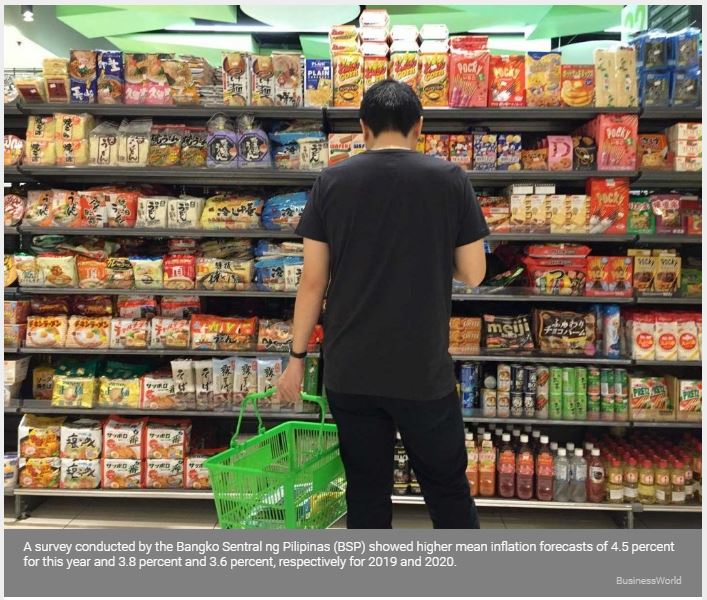Philippines: Private sector economists hike inflation forecasts foreasts
MANILA, Philippines — Economists of private banks expect higher inflation over the next three years amid higher and volatile global oil prices, weak peso, and the effects of the implementation of the tax reform program.
A survey conducted by the Bangko Sentral ng Pilipinas (BSP) showed higher mean inflation forecasts of 4.5 percent for this year and 3.8 percent and 3.6 percent, respectively for 2019 and 2020.
The survey covering 24 respondents was conducted from June 13 to 18.
“Analysts noted that risks to inflation in 2018 remain tilted to the upside,” the BSP said.
The respondents, the BSP said, cited possible risks to inflation such as the higher and volatile global oil prices, weakening peso, and the effects of the implementation of Republic Act 10963 or the Tax Reform for Acceleration and Inclusion (TRAIN) Law on the prices of domestic goods.
The economists also took note of the higher government spending on infrastructure, potential rise in wages, adverse weather conditions, higher utility rates, and the rising global inflation.
The Duterte administration has committed to undertake a massive infrastructure build up, earmarking P8.4 trillion for various infrastructure projects.
Standard Chartered Bank has the highest inflation forecasts at 5.2 percent for 2018, 4.9 percent for 2019, and 4.2 percent for 2020.
Union Bank of the Philippines expect inflation to average 4.8 percent this year followed by Security Bank and Deutsche Bank with 4.7 percent; as well as UBS, Philippine Equity Partners, Nomura, and Bank of China with 4.6 percent.
Al-Amanah Islamic Bank and Maybank-ATR KimEng have the lowest inflation forecast of 4.2 percent for 2018.
Based on the probability distribution of the forecasts provided by 20 out of 24 respondents, there was a 16.6-percent probability that average inflation for 2018 would settle between the two and four percent range, while there was an 82.8-percent chance that inflation would rise beyond four percent.
“Meanwhile, inflation is anticipated to moderate, stabilize, and settle within the two to four percent target range in 2019 to 2020 as TRAIN’s inflationary impact tapers off,” the BSP said.
For 2019, the respondents assigned a 60.8-percent probability that inflation would fall within the two to four percent target range.
Source: https://www.philstar.com/business/2018/07/23/1835828/private-sector-economists-hike-inflation-forecasts-foreasts#o8IGPsVFY3k3EPwg.99


 English
English




